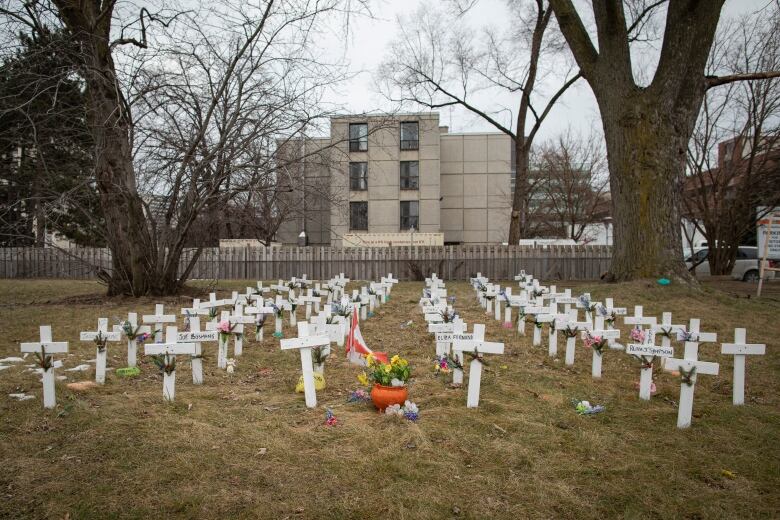One of the Ontario LTC homes hardest-hit by COVID-19 could soon be managed by non-profit
Posted: November 12, 2021
(November 11, 2021)
By: Sara Jabakhanji, CBC News

Camilla Care Community long-term care home in Mississauga, Ont., was among the hardest hit homes in the province during the COVID-19 pandemic with 68 resident deaths linked to COVID-19. (Paul Smith/CBC)
A Mississauga long-term-care home that saw one of the most devastating COVID-19 outbreaks during the first wave of the pandemic in Ontario is now in the process of being sold.
Sienna Senior Living, which owns the for-profit home along with dozens of others in the province, is in the midst of turning over Camilla Care Community to a not-for-profit organization and Trillium Health Partners (THP), a Greater Toronto hospital network, pending provincial approval.
Marilyn Elliott, head of the Camilla Care Family Council, said it’s a step in the right direction. Elliott’s 93-year-old mother Dorothy Wharram, has lived at the home since June 2019 and contracted COVID-19 last year.
“It’s a good thing, I think,” Elliott told CBC Toronto. “There is no way with that building that was built in 1970 to make it up to the current standards.
“I’m glad it’s got a future plan for it and for the people and staff,” Elliott said. “Change is hard but change can be good, if it’s done the right way.”
In all, more than 3,700 Ontario long-term care residents died of COVID-19 in 2020.
With 68 deaths, Camilla Community Care recorded one of the highest death tolls linked to the pandemic of any long-term care home in Ontario. It was one of five homes taken over by the province following a scathing report by the Canadian Armed Forces. For many critics, Camilla Care Community symbolized the inadequacy of for-profit long-term care and the lax enforcement of provincial regulations in the sector.

White crosses representing residents who died with COVID-19 are pictured on the lawn of Camilla Care Community on Jan. 13, 2021. (Evan Mitsui/CBC)
“There were mistakes made in the beginning, no one denies that … They’ve done much better since then,” Elliott said.
Under the deal, THP would take possession of the building and the land it sits on while the non-profit, Partners Community Health (PCH), would operate the home.
In a statement to CBC Toronto, a spokesperson for THP said the move will allow the hospital network to develop and expand long-term care in the area.
“Mississauga has 20 per cent fewer long-term care beds per capita than the provincial average and a growing seniors population, which means the community needs more, high quality and innovative long-term care home services than we have today,” said THP spokesperson Amit Shilton.
PCH will also be operating another long-term care home in Mississauga with 632 beds that is currently being built.
Deal ‘needs to happen more broadly,’ advocate says
Natalie Mehra, executive director of Ontario Health Coalition, said she believes the move is a positive development.
“I think [Camilla Care Community] was one of the most heartbreaking visual symbols of the devastation that was happening in the long-term care homes in the first wave,” Mehra said.
“Now to see hospitals step up and take over the infrastructure part and a non-profit take over the operations, I think it’s symbolic of what needs to happen more broadly across Ontario.”
Mehra said she has seen thousands of new beds go to for-profit homes. She said the idea of a non-profit and a hospital merging their efforts and coming together is necessary.
“We saw this as a unique opportunity to work with Trillium Health Partners, with whom we have a long-standing relationship, to address some of the critical needs around healthcare capacity and access to long-term care in the region,” said Nitin Jain, Sienna Senior Living President and CEO.
“This agreement is just one of the innovative ways we are collaborating across the sector to solve these challenges.”
In a letter to families on Monday, Sienna is promising no disruption in residents’ care as the transition proceeds.
“Our collective assurance throughout this transition is that you and your families are provided with frequent communication and that there is no disruption to the care and service provided to residents and families,” Sienna added.
The sale, if approved by the government, will be finalized in March, according to Sienna.
Click here for original article


